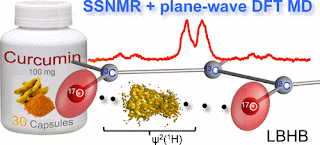Consequently, the following paper (published in October 2016) caught my attention.
Proton Probability Distribution in the O···H···O Low-Barrier Hydrogen Bond: A Combined Solid-State NMR and Quantum Chemical Computational Study of Dibenzoylmethane and Curcumin Xianqi Kong, Andreas Brinkmann Victor Terskikh, Roderick E. Wasylishen, Guy M. Bernard∥, Zhuang Duan∥, Qichao Wu∥, and Gang Wu
The authors state their motivation.
Curcumin was selected in our study, in part because it is being touted as a wonder drug and is of intense interest to the pharmaceutical and medical community.31−33This sounds quite exciting. Could low barrier hydrogen bonds be important in curing cancer?
Curcumin is a major ingredient of tumeric, the yellow spice, which features heavily in Asian cooking.
This got me Googling and it turns out the claims of a "wonder drug" are dubious.
Experimental studies of curcumin turn out to be particularly problematic, as explained in a blog post
Curcumin will waste your time by Derek Lowe. It is worth reading because it highlights the need for replication studies and publication of null results.
But it gets worse. References 31 and 32 have the same last author, Bharat Aggarwal, who it turns out has been the major proponent of the "wonder drug". In 2015 he "retired" from the University of Texas, following allegations of scientific fraud. By August 2106, eighteen published papers by him had been withdrawn.
To illustrate the problem of metrics, in 2016 Aggarwal had an h-index of 160, and in 2015, Thomson Reuters (ISI Web of Science) listed him among the World's Most Influential Scientific Minds.
I should stress that none of this invalidates the results of the hydrogen bonding paper that got me on this trail.





Every day there are news reports of new health advice, but how can you know if they're right? Doctor and epidemiologist Ben Goldacre shows us, at high speed, the ways evidence can be distorted, from the blindingly obvious nutrition claims to the very subtle tricks of the pharmaceutical industry.
ReplyDeletehttps://www.ted.com/talks/ben_goldacre_battling_bad_science
Initially Ben G plays to the gallery, but later gets serious and comes out with details. Very relevant to your posting
It may not be all nonsense:
ReplyDeletehttps://www.sciencedirect.com/science/article/pii/S1064748117305110
It may not all be nonsense, true. But one study (either way), even if apparently set up in a proper way (double blind etc) is not conclusive.
DeleteSee the discussion by Ross here:
https://condensedconcepts.blogspot.com/2018/01/should-we-be-concerned-about.html
I'm not sure how to solve this; we've all heard the coffee is bad/good for you. Without checking the literature, there will be properly set up studies with opposing conclusions.
While it is quite impressive that medical science has progressed the way it has, this issue shows that biological systems are incredibly diverse, and we may not have found the ideal way to draw generic conclusions.
"authentic biogibberish" Nobel proze winner J Hall comes out with a new word for this type of research. This video has this.
ReplyDeletehttps://www.youtube.com/watch?v=-Ct1hkROmxc
Cornell University
ReplyDeleteFresh concerns raised over academic conduct of major US nutrition and behaviour lab
https://www.theguardian.com/science/head-quarters/2017/mar/02/fresh-concerns-raised-over-academic-conduct-of-major-us-nutrition-and-behaviour-lab